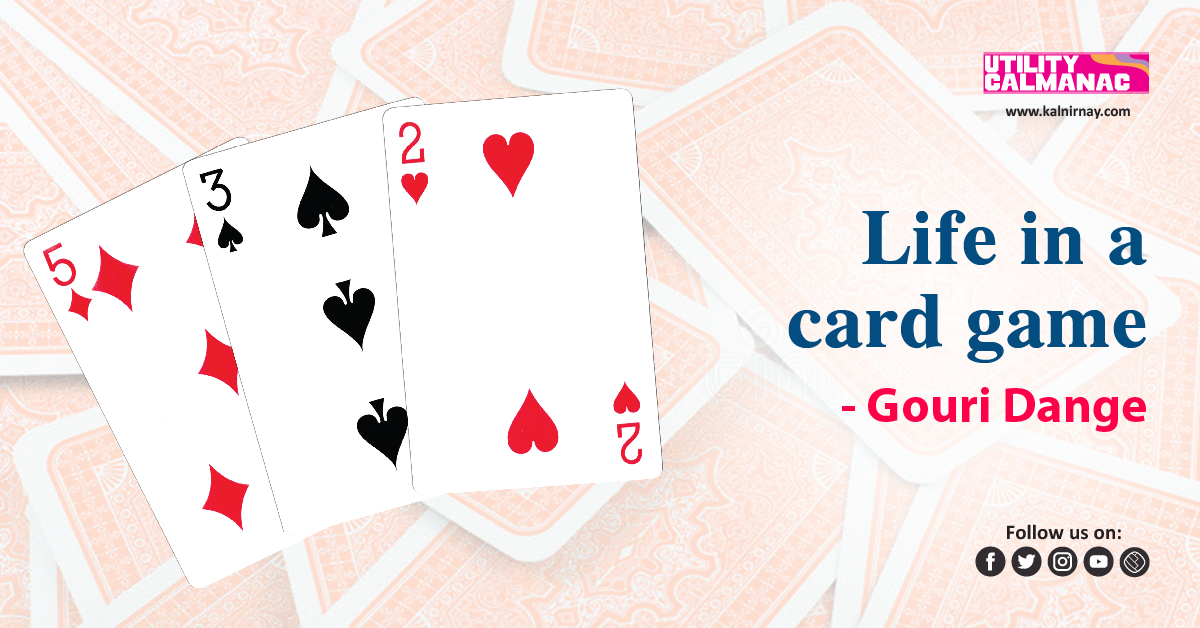Life in a Card Game
How our childhood favourite Do-Teen-Paanch teaches us some crucial life lessons.
Whether you call it Five-Three-Two, Do-Teen-Paanch, or Paach-Teen-Don, you must have played it sometime – as children or with children. Let’s look at the game and the life lessons to learn from it!
It’s a simple little card game. The dealer distributes thirty cards amongst three players, and each person has to make five, three, or two ‘haath’, or ‘hands’ or ‘tricks’ as they call it in English. The person who has to make five hands declares the ‘hukum’ or trump. This is done based only on the first 5 cards that he/she gets, not after seeing all 10 cards.
And right there is the first of many life lessons that emerge as you play some rounds of this game. Declaring a Trump based on five cards is not an easy thing. It is an iffy proposition. Firstly, there is so little to choose from, and secondly, what kind of cards you get in the next five that come to you can either buttress your decision or completely nullify it.
Lesson No. 1
Here comes Lesson No. 1. However pleased or dismayed you are with your cards, it is important not to react and exhibit your feelings immediately. In some life situations, it is important not to ‘put all your cards on the table’ at all times. Wait, watch, and use your energies to focus rather than react.
Lesson No. 2
The game also teaches you another crucial tip. A bad hand dealt to you is perhaps a matter of luck. But how you play it is a matter of good strategy. And there is Lesson No. 2: Weigh your choices and pay attention to what others are playing, rather than being caught up only in the cards in your hands. From this, you will optimize your resources and play a better game, whatever cards you have been dealt.
Are these very big words for a children’s card game? Well, you’ll be surprised how this simple game, easily mistaken for a ‘childish’ one, has hidden depths.
Lesson No. 3
The lessons reveal themselves at every juncture. For instance, how do you behave on a winning streak? Do you exult and chest-thump and derive pleasure from the other players’ bad luck or mistakes? Lesson No. 3: Enjoy your success, be happy that you had luck and used your acumen well, but be graceful about it. To decimate your opponent by jeering and mocking means you rob them of their dignity. And this means that the person is then unable to acknowledge or celebrate your victory.
Lesson No. 4
The game of Five-Three-Two involves dealing with debt, too. If you make more hands/haath than you need to, this means that another player has made lesser than they need to. In the next round of the game, you get to demand and extract those extras that the person owes you.
Sometimes, your opponent goes deeper and deeper in debt, owing you heftily in each round. How you deal with this carries a life lesson, too. Lesson No. 4: Sometimes, you can afford to let go of some gains, especially if you are doing exceedingly well and the other person is buried in debt.
Know when you can step back and waive some of it so that the person gets a chance for some recovery. Let go of some of the debt only if you think it is appropriate. If you feel the person has had bad cards but is also playing carelessly and recklessly, you can point that out, too. Above all, avoid being smug just because you’re doing well!
Lesson No. 5
If you are going to recover your debts, there is a gracious way of doing this. For instance, if the person has offered to make hands and return them in the next game, don’t grab the hand they make. Wait till they return it to you. Lesson No. 5 is to believe that most people who owe you know their obligations. Ask or demand only if the person has actually forgotten or is trying to avoid returning it.
Lesson No. 6
What about the lessons on losing that are embedded in this game? Are you a sporting loser or a sore one? Do you ruin your mood, begin to get grumpy and envious and stop enjoying the game completely? Or worse, do you try to cheat or cover up mistakes by blaming the other players and your luck, even throwing the cards down and walking away in a huff? Lesson No. 6 involves working with whatever you have, even if it is not what you expected or wanted. That old saying ‘If life gives you lemons, make lemonade’, is so appropriate here! And there is also joy in enjoying other people’s good fortune. Once you believe and live that, you’ll be surprised how much less insecurity and envy you experience.
Lesson No. 7
There is another absolutely crucial life lesson when it comes to the ‘amnesty’ or ‘loan maaf’ that a person in a better position than you may offer you. Lesson No. 7 is all about never playing with the assumption that someone will bail you out if you make a long face and sad eyes! Play with integrity and apply your mind, rather than becoming dependent on hand-outs and sympathy. That can be a game-changer for you.
Lesson No. 8
One last lesson from Five-Three-Two to take into our daily lives is Lesson No. 8: Remain interested, have fun, and enjoy a few laughs, including at yourself. Gains and losses are part of the game, they come and go. It is your joie de vivre and fellow players who are your most precious resources. Cherish them!
To read more English blogs, please visit our blog section.
Gouri Dange
The author is an experienced counsellor and writer.

